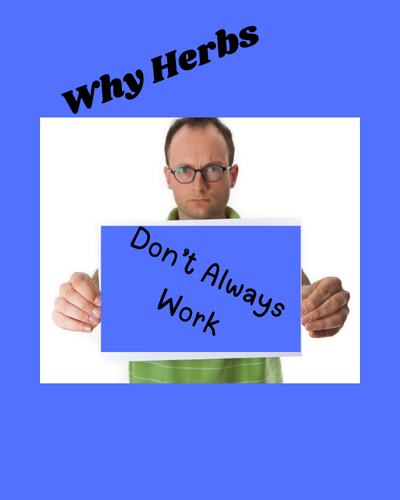Why Don't My Herbs Work For Me? How To Correct The Problem
Jan 6th 2025
Why Herbs Sometimes Don’t Work: Understanding the Limitations and Finding Solutions
Herbs have been a fundamental part of natural medicine for centuries, relied upon to promote health, prevent illness, and treat a variety of conditions. In today's world, where interest in holistic and alternative medicine is growing, many people turn to herbs as natural alternatives or complementary treatments to conventional medicine. However, herbs don’t always provide the expected results, leaving users frustrated and unsure about why they didn't work as hoped. In this comprehensive guide, we will delve into the possible reasons herbs might not work, and offer solutions to help you make the most of your herbal remedies.
Why Herbs Might Not Work
Herbs are powerful, but their effectiveness can vary due to several factors. Here are the key reasons why herbs may sometimes fail to deliver the desired results:
 1. Quality and Purity of Herbs
1. Quality and Purity of Herbs
One of the most significant factors in determining the success of herbal remedies is the quality and purity of the herbs themselves. Herbs can be contaminated, adulterated, or improperly processed, all of which reduce their potency and effectiveness. Some mass-produced herbal products may even contain fillers or chemicals that can dilute their healing properties.
Solution: Always purchase herbs from reputable suppliers or trusted herbalists. Look for certified organic labels, non-GMO certifications, and companies that practice sustainable sourcing. Choosing high-quality, whole herbs ensures you’re getting the full medicinal potential of the plant.
2. Incorrect Dosage
Just like pharmaceuticals, herbs must be taken in the right dosage to be effective. Taking too little can result in no noticeable benefit, while taking too much could lead to side effects or toxicity. Many people are unsure of the proper dosage, especially when using dried or fresh herbs, or when preparing them in different forms such as teas, tinctures, or capsules.
Solution: Consult an experienced herbalist or healthcare professional to determine the appropriate dosage based on your condition, weight, and overall health. This tailored advice can prevent under- or overdosing and ensure you’re using the herb safely and effectively.
 3. Interactions with Mediations
3. Interactions with Mediations
Herbs can interact with prescription medications, potentially reducing the effectiveness of either the herb or the medication, or worse, causing harmful side effects. For example, St. John’s Wort is known to interfere with antidepressants and birth control, diminishing their effectiveness.
Solution: Always inform your healthcare provider if you’re taking herbs alongside medications. They can guide you on potential interactions and adjust your treatments accordingly to avoid adverse effects.
4. Underlying Health Conditions
In some cases, herbs alone may not be enough to treat symptoms if there are deeper, unresolved health issues. For instance, chronic conditions such as autoimmune disorders, diabetes, or thyroid imbalances may require more comprehensive treatment strategies.
Solution: Address any underlying health issues with the help of a healthcare provider. Herbs can be a wonderful complement to conventional treatments, but they should not be seen as a replacement when dealing with complex or chronic health problems.
5. Individual Variability
No two bodies are the same. Our genetics, lifestyle, biochemistry, and even gut health can all impact how we respond to herbs. A remedy that works wonders for one person may do little for another because each person’s system processes herbs differently.
Solution: Keep a personal journal of your experiences with herbs. Record how much you take, when, and what effects (if any) you notice. This will help you discover which herbs work best for your unique body chemistry and needs.
6. Lack of Consistency
Herbs often need time and consistency to show results, especially when dealing with chronic conditions. Sporadic or short-term use may not give the herb enough time to work, particularly if you're looking for long-term health benefits.
Solution: Make herbs a consistent part of your daily routine. Whether through teas, tinctures, capsules, or even soups and broths, regular use is often key to experiencing their full benefits. Build habits around herbal use, just as you would with vitamins or medications.
7. Limited Knowledge About the Herb
Not every herb is suited for every condition, and sometimes people have unrealistic expectations about what a particular herb can achieve. For example, using a relaxing herb like chamomile for a condition that requires a more potent anti-inflammatory may lead to disappointment. That’s why, here at 1st Chinese Herbs, we provide references on our product pages, so you can review the research and information for yourself. Everything is transparent, making it easier to understand what you’re working with and helping you make informed choices for your health needs.
Solution: Research the specific herbs you’re using to ensure they’re appropriate for your condition. Consult reliable resources, such as books written by herbalists or healthcare providers, or seek the guidance of an expert in herbal medicine.
How to Correct the Issue When Herbs Don’t Work
If your herbal remedies aren’t working as expected, don’t give up just yet. Here are some steps to help you get back on track:
1. Consult a Professional
Engaging with a certified herbalist, naturopath, or a healthcare provider knowledgeable about herbs can make all the difference. They can help identify why your current herbal regimen may not be working and offer alternatives or adjustments.
2. Reevaluate Your Approach
Consider your overall health and lifestyle. Factors such as diet, stress, physical activity, and sleep can influence how well herbs work. For example, a poor diet high in processed foods may counteract the benefits of immune-boosting herbs.
 3. Experiment with Different Herbs
3. Experiment with Different Herbs
If one herb isn’t yielding results, don’t hesitate to try others. Each herb has its unique properties, and another option might be better suited for your specific condition or body type.
Let’s think this through logically—if all herbs worked the same way for everyone, then why would there be such a vast variety of herbs used in traditional medicine? The truth is, no single herb works universally for every person or every condition. Our bodies are all unique, which is why certain herbs may work wonders for some people but do little to nothing for others.
Take chamomile, for example. For many, chamomile is a well-known remedy to relax the mind and calm an upset stomach. It’s soothing, gentle, and widely regarded as an excellent herb for relaxation. However, while chamomile works wonderfully for some, there are many people who feel little to no effect from it. This can be frustrating, especially when it’s often recommended as a go-to herb for relaxation. But here’s the key: just because one herb doesn’t work for you doesn’t mean herbal remedies as a whole are ineffective.
For those whom chamomile doesn’t work, a different herb, like Suan Zao Ren (Ziziphus seed), may be the perfect solution. Suan Zao Ren is widely used in Traditional Chinese Medicine for its calming properties and is particularly effective for people who struggle with sleep issues or nervousness. So, while chamomile may not bring relief to everyone, another herb with similar calming effects may work perfectly.
This highlights the beauty and complexity of herbal medicine. It’s not about finding one miracle herb—it’s about finding the right herb for your body and your specific needs. That’s why there are so many herbs used for different conditions. Each plant brings its own unique set of compounds, and these interact differently with our individual biochemistry.
In essence, herbal medicine offers a personalized approach to health. Instead of expecting one herb to be a cure-all, we can embrace the variety of options available to us. When one herb doesn’t seem to work, it’s worth exploring other possibilities. There are often alternative herbs with similar benefits that could be the answer for you.
So, don’t give up if one herb doesn’t deliver the desired results. The diversity in nature’s pharmacy is there for a reason—to give us options. It’s all about finding the herb that resonates best with your body and lifestyle.
4. Use Combined Therapies
Herbs work well when integrated into a holistic approach to health. Combining herbs with therapies such as acupuncture, massage, or dietary changes can often enhance their effectiveness.
5. Stay Educated
Keep learning about herbs and their uses. Attend workshops, read reputable books, and stay up-to-date with current research. The more you know, the better you can make informed decisions about your herbal health.
Conclusion
While herbs offer remarkable potential for improving health and treating ailments, they are not a one-size-fits-all solution. Factors such as the quality of herbs, correct dosage, individual differences, and underlying health conditions can all affect their effectiveness. By understanding these limitations and taking proactive steps—such as consulting professionals, being consistent, and doing your research—you can greatly increase the likelihood of success with herbal remedies. Remember, patience and personalization are key to unlocking the full benefits of herbal medicine.
Let me give you an example. Someone was suffering from terrible headaches and couldn’t find relief, despite trying everything. None of the herbs seemed to work. She asked a friend for advice, and her friend suggested trying psyllium husk. However, what she didn’t realize was that her friend’s headaches were caused by constipation, while hers were due to stress. In this case, psyllium husk wasn’t going to help her because the root cause of her headaches was completely different. This highlights how important it is to understand the underlying cause of an issue before choosing the right remedy.
Happy healing!


